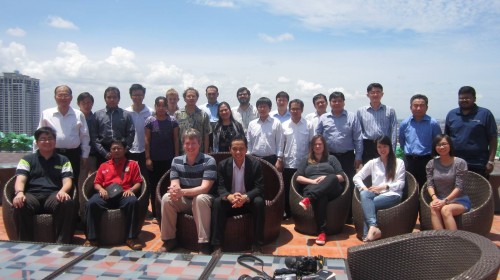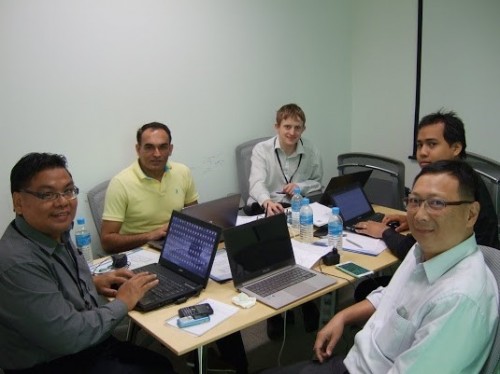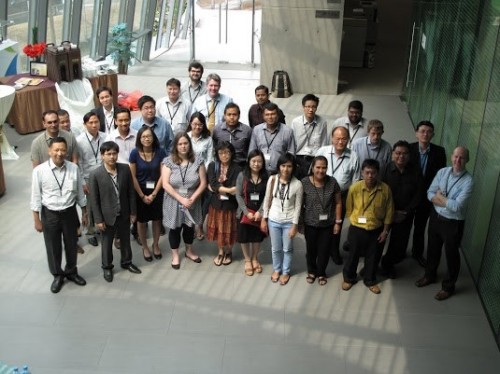19th March 2014 Bandar Seri Begawan, Brunei
Regional Southeast Asia Climate Analysis and Modelling (SEACAM) Workshops
This is a guest blog by Dr Saiful Azmi bin Hj Husain, a senior lecturer at the Department of Mathematics, Faculty of Science, Universiti Brunei Darussalam (UBD). He has been taking part in the Southeast Asia Climate Analysis and Modelling (SEACAM) framework initiated by the Centre for Climate Research Singapore (CCRS) in collaboration with the UK Met Office Hadley Centre (MOHC). In this blog, he writes about the project’s most recent workshop in Singapore and gives background on the project’s earlier stages.
Background
The Southeast Asia Climate Analysis and Modelling (SEACAM) framework was initiated by the Centre for Climate Research Singapore (CCRS) in 2011 in collaboration with the UK Met Office Hadley Centre (MOHC).
Its objectives are to enhance regional scientific cooperation and increase scientific capacity of the regional National Meteorological and Hydrological Services (NMHS) and research institutes through workshops and collaborative projects related to regional climate analysis and modelling.
To date, four workshops have been organised.
SEACAM workshop 3(26-30 August 2013, Phnom Penh, Cambodia)

The Regional SEACAM project was funded by the CCRS, the UK Foreign and Commonwealth Office (FCO), the UK MOHC and National Meteorological Services and Scientific Institutions across the ASEAN region. 2 representatives from each ASEAN country attended the workshop. Brunei Darussalam was represented by Dr Hj Sidup Hj Sirabaha (Deputy Director, Brunei Darussalam Meteorological Department, Ministry of Communications), Dr Lalit Dagar (Research Fellow, UBD|IBM Centre, Universiti Brunei Darussalam) and myself.
Mr David Hein, Regional Modelling and PRECIS (Providing Regional Climates for Impacts Studies) coordinator, was responsible for coordinating the workshop, assisted by Mr Raizan Rahmat, from the CCRS. The SEACAM Workshop: Foundation, Activities and Objectives were initially briefed by David and Raizan and stakeholder presentations were given by representatives from ASEAN countries. The simulations were performed using the PRECIS package which can be easily applied to any area of the globe to generate detailed climate change projections.
Specific Work Packages (WP) for the Project Workshop
In this workshop, we had the opportunity to introduce ourselves, and the current research that we were involved with, discussing and reviewing few scientific papers and presenting our results from the review.
The most important agenda in the workshop is to be involved in the SEACAM-DURIAN experiments: Design, Scientific Rationale and Uncertainties of the Work Packages. Introduction to Data Analysis Tools such as Climate Data Operators (CDO), developed by Max-Planck Institute, Germany as well as NCAR Command Language (NCL), developed by National Center for Atmospheric Research, USA.
I had the opportunity to experience hands-on practical in writing algorithms and computer codes for running the climate simulations for ASEAN countries. We also had the opportunity to discuss worksheet results and brief reports were given by each group on the day’s accomplishments.
On the final 2 days of the workshop, we were allowed to choose any of the Work Packages, namely WP1 (Annual Cycle), WP2 (Precipitation and Temperature), WP3 (Monsoons) and WP4 (Extreme events). Regional Climate Models historical (hindcast) runs were evaluated against observations for each of these work packages, and their future projections were also analysed.
I chose WP1 (Annual Cycle) to analyse the annual cycle for the precipitation and surface temperature of Southeast Asia regions, using the data analysis tools, i.e. CDO and NCL. The objective of the study is to understand the changes in climate parameters especially surface air temperature and precipitation for individual countries of South East Asia and to analyse the future projections for this region.
The next steps were to work together among the WP group for the next 5 months to come out with a more detailed technical report.
SEACAM workshop 4 (25-27 Febuary 2014, Singapore)
The 4th SEACAM workshop focused on reviewing and improving analyses done on the PRECIS Regional Climate Modelling output at the previous workshop in Phnom Penh and the subsequent months following that workshop. The main aim of this workshop was to finish the first draft of the technical report covering the findings, which will be submitted in late March 2014.

In this workshop, participants continued to work on the visualisation and the analyses of the model output in their respective work packages and discussed their findings. Future work of SEACAM was also discussed at the fourth workshop. The participants had the opportunity to listen to a series of science talks given by various scientists around the globe.
Benefits of a becoming a participant involved in SEACAM project
In this workshop, I have learnt more about the analysis/visualisation of climate model output data and vital skills in scientific software packages which can be used in my future research. Foundational work in analysis of these experiments will enable me and other scientists around Southeast Asia to carry out more specific, in-depth research on the data from these experiments in the future. Formation of professional links with other participants across the ASEAN region and with MOHC scientists were also established during the workshop.

I would like to take this opportunity to thank Universiti Brunei Darussalam (UBD) for allowing me to attend this excellent workshop and special thanks to the UK FCO, the UK MOHC and CCRS, National Environmental Agency, Singapore for kindly funding this excellent & prestigious workshop. I will continue to establish professional links with various Climate Scientists colleagues across the ASEAN region and World Renowned MOHC scientists for future joint collaborations.